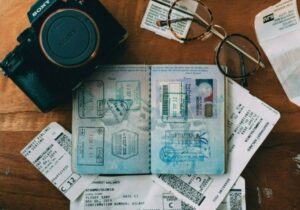Receiving French citizenship holds significant benefits for individuals who wish to establish connections with France’s rich cultural heritage. French nationality grants the holder the right to live, work, and study in France without restrictions and unrestricted travel within the European Union.
As a French citizen, you access France’s globally renowned healthcare and education systems. Additionally, French citizens can participate in the democratic process, including voting in French elections and referendums, and running for public office.
Overall, acquiring French citizenship provides practical benefits and a chance to become part of French society and an intercontinental community.
Benefits of French Citizenship: Embrace a World of Opportunities

Here’s an in-depth look at the benefits and privileges you access when you acquire French nationality:
Travel freedom: As a French national, you gain visa free entry or visa on arrival access to a vast number of countries worldwide to travel internationally, be it an EU country or a non-EU country. France consistently ranks high in the Global Passport Index, providing you the freedom to travel and explore diverse destinations with a valid passport without the hassle of extensive visa requirements.
EU citizenship: France is a member of the European Union (EU), and a French passport grants you EU citizenship. This means you can live, work, or study in any EU member state without applying for a visa or EU residence permit.
Quality healthcare: France is renowned for its high-quality healthcare system, often considered one of the best in the world. France employs a statutory health insurance (SHI) system funded by employee and employer contributions. As a French citizen, you have access to comprehensive healthcare services, ensuring your well-being and peace of mind.
Excellent education: French nationality comes with the benefit of studying in a world-class education system, including prestigious universities and renowned research institutions. Access to quality education for French nationals opens doors to diverse career opportunities through France and the EU.
Social welfare: French nationals enjoy the benefits of a comprehensive social welfare system. Social benefits include unemployment benefits, family allowances, and a robust pension system, ensuring a safety net during various life stages.
Employment opportunities: When you’re granted French nationality, you expand your opportunities. French citizens have access to a wide range of job opportunities in France and across the EU countries through freedom of movement, making it easier to pursue their career aspirations.
How to Obtain French Citizenship
French nationality is historically based on both the principles of jus soli and jus sanguinis. The French government provides various avenues for obtaining French citizenship. These pathways encompass citizenship by descent for children born to French parents, marriage to a French national, naturalization, and children born abroad and adopted by French parents.
 French citizenship by birth
French citizenship by birth
Individuals born in France to French parents acquire the country’s nationality at birth. A person born on French soil to foreign parents may acquire French nationality at birth if:
- They have at least one parent born in French territory
- At least one parent was born in Algeria before 3 July 1962
- They were born stateless in France
 French citizenship by adoption
French citizenship by adoption
Simple adoption: Simple adoption grants the right to French citizenship by French authorities. Adopted children 15 and over with a French parent will retain their original citizenship but can request French nationality by declaration.
Plenary adoption: Plenary adoption grants French citizenship automatically by French authorities. Adopted children under 15 with a French parent acquire their adopted parent’s French nationality automatically.
Consent and French adoption papers are only issued by the Department of Social Welfare for Children (ASE) under the purview of the President of the General Council of their administrative department.
 French citizenship by descent
French citizenship by descent
The French law for citizenship by descent has changed several times; however, the current law has been simplified for those born with a a citizen of France. A child born to at least one parent who was a French citizen at the time of the child’s birth has the right to obtain French nationality. French citizenship by descent law is the same for Children born in France or abroad.
 French citizenship by marriage
French citizenship by marriage
A foreign national with a French spouse is entitled to French citizenship by marriage if they have been married for four years. To qualify, non-French spouses must have lived in France for more than three years and cohabited with their French partner since their marriage, and the French spouse must have acquired French nationality prior to the marriage.
The naturalization period increases to five years if:
- They have not lived in France continuously for three years
- They lived abroad when their French partner was registered at the French Consulate
All applications for French citizenship by marriage must have had the marriage entered into the French civil registry, and applicants are required to have a clean criminal record and prove French language skills.
 French citizenship by naturalization
French citizenship by naturalization
Naturalization is a common path foreign citizens choose to obtain French citizenship. Eligibility for French nationality includes:
- Being at least 17 years of age
- Holding a valid French residence permit and have lived in France continuously for at least five years
- Proficiency in writing and speaking French to at least B1 level
- Demonstrating knowledge of French society and French history and historical events such as the French Revolution
 French citizenship by naturalization for EU nationals
French citizenship by naturalization for EU nationals
EU citizens can apply for French citizenship by naturalization if they have lived in France for at least five years. However, the requirement doesn’t include holding a valid French residence permit.
 French citizenship for refugees
French citizenship for refugees
Refugees are not required to maintain five years of residency or prove proficiency in French if they speak a foreign language to qualify for French citizenship. When an individual receives refugee status in France, they become eligible to obtain French citizenship.
 French citizenship through military service
French citizenship through military service
Joining the French Foreign Legion is a unique pathway to acquiring French citizenship. Foreign nationals can enlist in the Legion, a branch of the French Army open to applicants from around the world. Provided Legionnaires have rendered exceptional services to the Legion, they can apply for French citizenship after three years. Potential applicants must note that the minimum period of service is five years.
French Residency by investment

French Tech Visa is a fast-track program to attract foreign talent in the tech and innovation industries. The visa program is part of the French Tech initiative, aiming to develop and expand the French tech ecosystem and position France as one of the global leaders in technological innovation. The visa is available in three categories:
- Start-up employees who are members of one of the French Tech Hubs
- Scale-up employees selected by the French Tech Mission
- Investors and entrepreneurs with a project approved by the French Tech Mission
The visa program provides a streamlined application process and grants qualifying applicants a four-year renewable residence permit, allowing them to reside and work in France. After five years of residency, permit holders can apply for French, provided they meet certain eligibility criteria, including continuous residence in France and the ability to speak French.
How to Apply for French Citizenship
Depending on the pathway, you may need to meet certain eligibility criteria, such as completing a French language test, attending interviews, or submitting other relevant documentation to support your application. Patience is key, as processing times can vary.
Upon approval, you’ll participate in a citizenship ceremony, officially becoming French citizens in the French Republic. This guide will determine specific requirements and procedures:
1. Determine your eligibility: Before applying, ensure that you meet the eligibility criteria for the chosen pathway to citizenship. If you have non-French parents, you will need their birth certificate to prove they were born in France to apply for French citizenship by descent.
2. Gather required documents: Collect all the necessary documents per your chosen method under French nationality law. Supporting documents include:
- Your French parent’s birth certificate
- Your non-French parents’ birth certificate if they hold a foreign citizenship but were born in France
- Your marriage certificate that was entered into the French civil registry
- Adoption papers granted by the Department of Social Welfare for Children
- Your residence permit and proof of living in France for at least five years
- Proof of refugee status with a certificate issued by the UN Refugee Agency
In addition to proof of your claim to French citizenship, you will need to present additional documentation such as:
- Proof of a clean criminal record
- A language proficiency certificate
- Your birth certificate
Documents in a foreign language must be accompanied by a sworn translation and certified by an apostille.
3. Complete application form: Obtain the relevant French citizenship application form from service-public.fr, the official French government website for immigration services. If you live abroad, you can obtain the relevant documents from your nearest French Embassy or Consulate.
4. Submit your application: Depending on your situation, you can submit your application through service-public.fr if you live in France or at a French Consulate if you live abroad. Ensure that you provide all required and supporting documents with the application form.
5. Pay application fees: Be prepared to pay the applicable processing fees. These fees can vary depending on your chosen method and may change over time, so check with the relevant authority for the most up-to-date information.
6. Attend interviews and French language tests (if required): For certain pathways, like naturalization or marriage, you may need to attend interviews and demonstrate French language proficiency and sufficient knowledge of French culture and French people.
7. Await processing: The processing time for your application can vary depending on your circumstances and the workload of the authorities. Be patient during this waiting period.
8. Attend citizenship ceremony: If your application is approved, you may be invited to attend a citizenship ceremony from your home country. This is a formal event where you declare allegiance to France on the French territory.
9. Receive your certificate of French citizenship: After completing the process, you will receive an official document or a certificate of French citizenship. This certificate is essential for various administrative purposes.
10. Apply for a French passport (if desired): Once you become a French citizen, you can apply for French travel documents. It’s important to note that the specific requirements and procedures can vary based on your chosen method and individual circumstances.
French Citizenship Processing Time
Applications to obtain French nationality have a general processing time of 18 months to two years. This is regardless of whether the application is submitted for French citizenship by descent or for foreigners with French citizen parents or a French residence permit seeking naturalization.
French Dual citizenship
France generally allows dual citizenship for French and foreign nationals. This enables you to maintain a French passport and a valid passport in your original country of citizenship, provided it also allows dual citizenship.
French dual nationality offers flexibility for international living and travel. As soon as you claim citizenship in France with your common-law partner or family members, you can enjoy the best of both worlds by securing dual nationality.
How to get a French passport?
Applying for French citizenship involves a thorough and sometimes complex process. Generally, individuals become eligible for French citizenship through various means, including citizenship descent from a French parent, marriage, naturalization, or adoption.
Once you establish your eligibility based on your circumstances, the process typically involves gathering essential documents, completing an application form, and submitting it to the appropriate authorities.
- Acquire French citizenship: Before obtaining a French travel document, you must first become a French citizen through one of the recognized methods. Ensure that your citizenship status is in order.
- Gather required documents: Collect the necessary documents to support your passport application. These typically include your French national identity card, proof of French citizenship, and proof of residency in France.
- Complete the passport application form: Obtain a French passport application form, available online or at your local prefecture. Fill out the form accurately, providing all required information.
- Provide recent passport photos: Attach recent passport-sized photos that meet the specific requirements outlined in the application guidelines. The number of photos required may vary.
- Pay the passport fee: Be prepared to pay the passport application fee. The cost can vary depending on your age and the passport’s validity period. Check with the issuing authority for current fee information.
- Submit your application: Submit your completed passport application, the necessary documents, and fee payment to the appropriate authority. This could be your local prefecture, town hall, or consulate.
- Await processing: The processing time for a French nationality passport can vary, so plan accordingly. It may take several weeks to receive your new passport, especially during peak application periods.
- Collect your passport: You’ll be notified to collect it once it is ready. You must visit the designated location in person to receive your passport. Remember to bring the notification and any required identification.
Frequently Asked Questions about French Citizenship
Are babies born in France automatically citizens?
A child born in France is generally automatically considered a French citizen if at least one of their parents is a French citizen, regardless of the nationality of the other parent. This is known as the principle of “jus sanguinis,” or right of blood. However, there are specific rules and exceptions if you are born abroad to French citizens residing abroad. Checking with the local authorities or a legal expert for precise guidance is advisable.
How long does it take to become a French citizen?
The time it takes to become a French citizen can vary depending on your chosen pathway and immigration authorities. For example, French citizenship by descent or birth is automatic if you meet the criteria. At the same time, naturalization necessitates living in France for at least five years, with no long stays outside the country in the five-year period, and an 18-month to two-year application process. Each method has its own set of requirements that can make the process longer than another.
Can I live in the UK with a French passport?
As a French passport holder, you don’t have the right to live and work in the United Kingdom. France is part of the European Union and Schengen Area, and the UK left the Union in January 2020. France is also not part of the UK’s Common Travel Area (CTA), which allows the free movement of citizens between the UK and specific countries.
Can I apply for French citizenship through descent or ancestry?
To obtain French citizenship by descent, one of your parents must have held French citizenship at the time of your birth.
What happens if my citizenship application is rejected?
If your application to obtain French citizenship is refused, you must appeal to the Ministry of Interior through the courts within two months of refusal. Getting a reply in certain conditions can take up to four months.
Can I get a French passport if my grandfather was French?
Unlike the laws for citizenship by descent in other countries like Italy and Ireland, eligibility for citizenship by descent in France does not include extended family members such as French grandparents. To obtain French citizenship by descent, you must have at least one parent who was a French citizen at the time of your birth.




